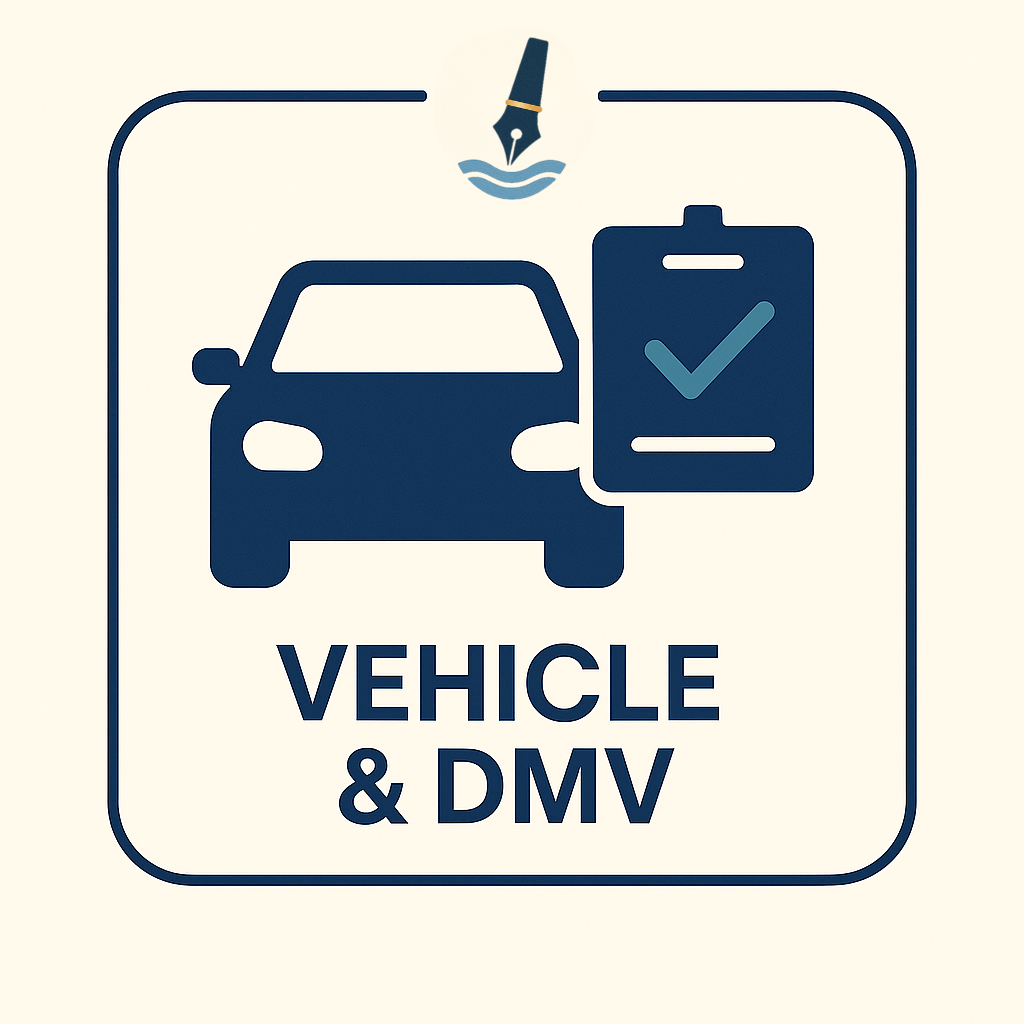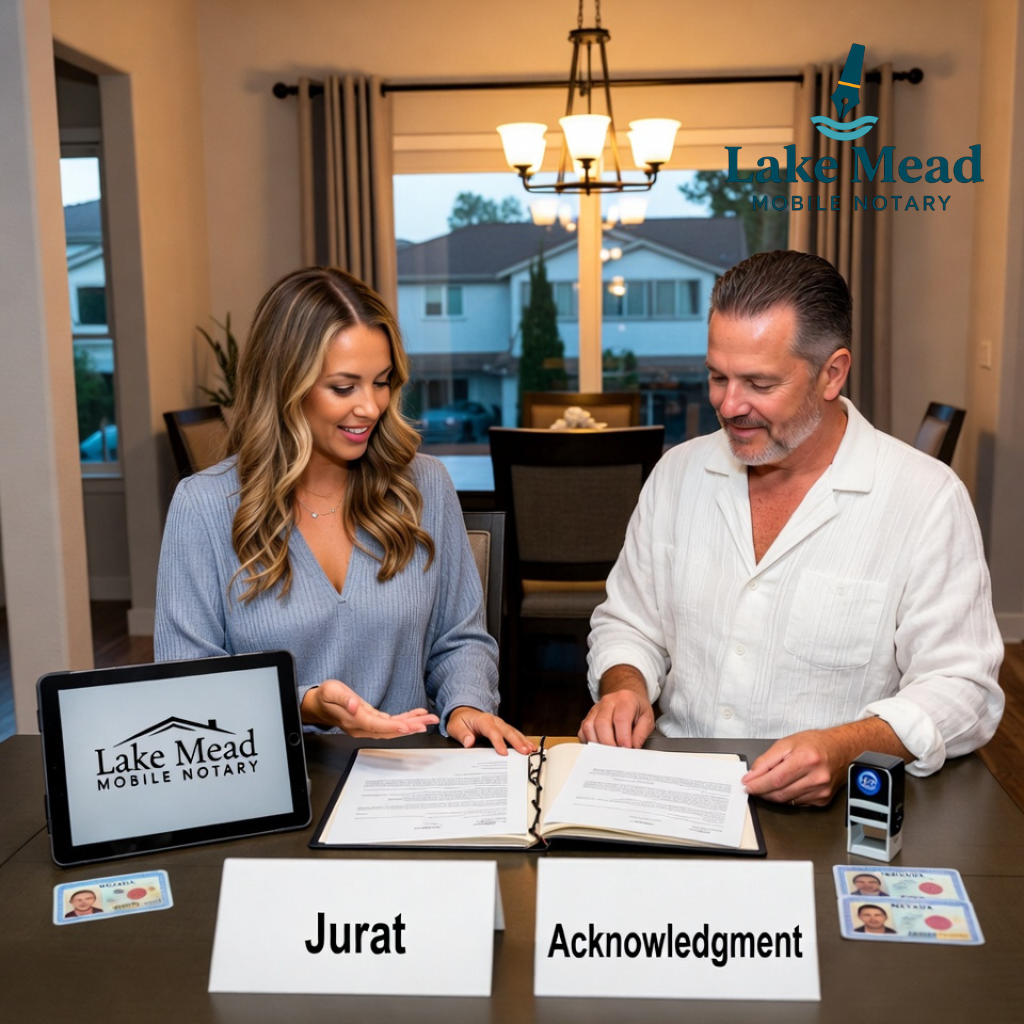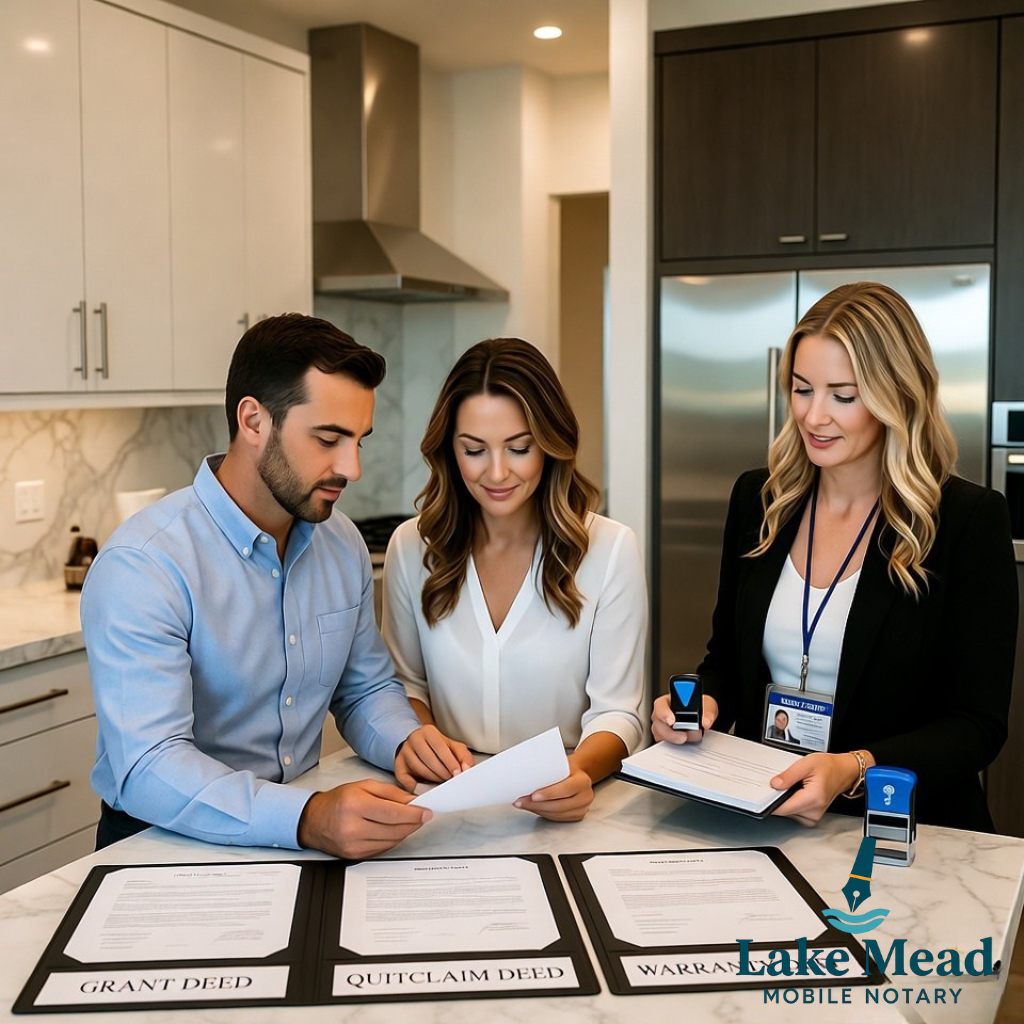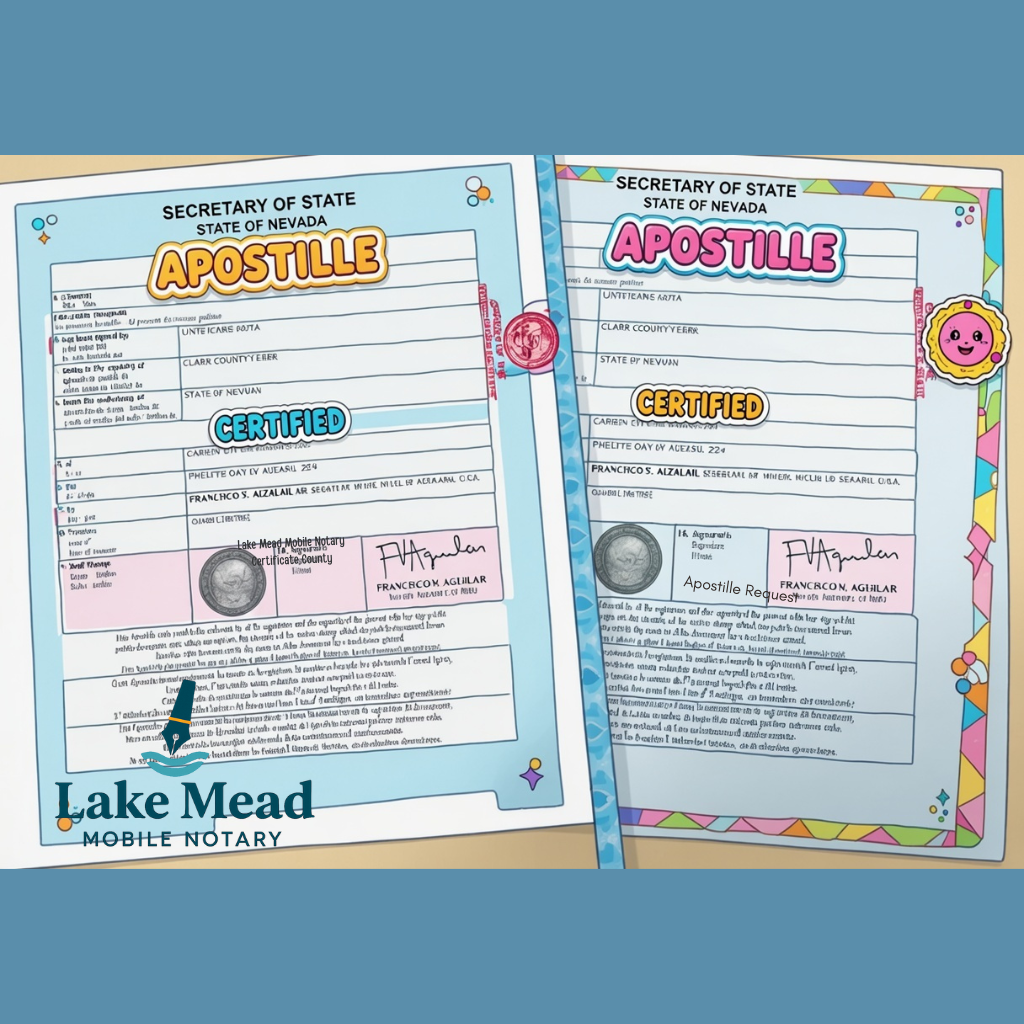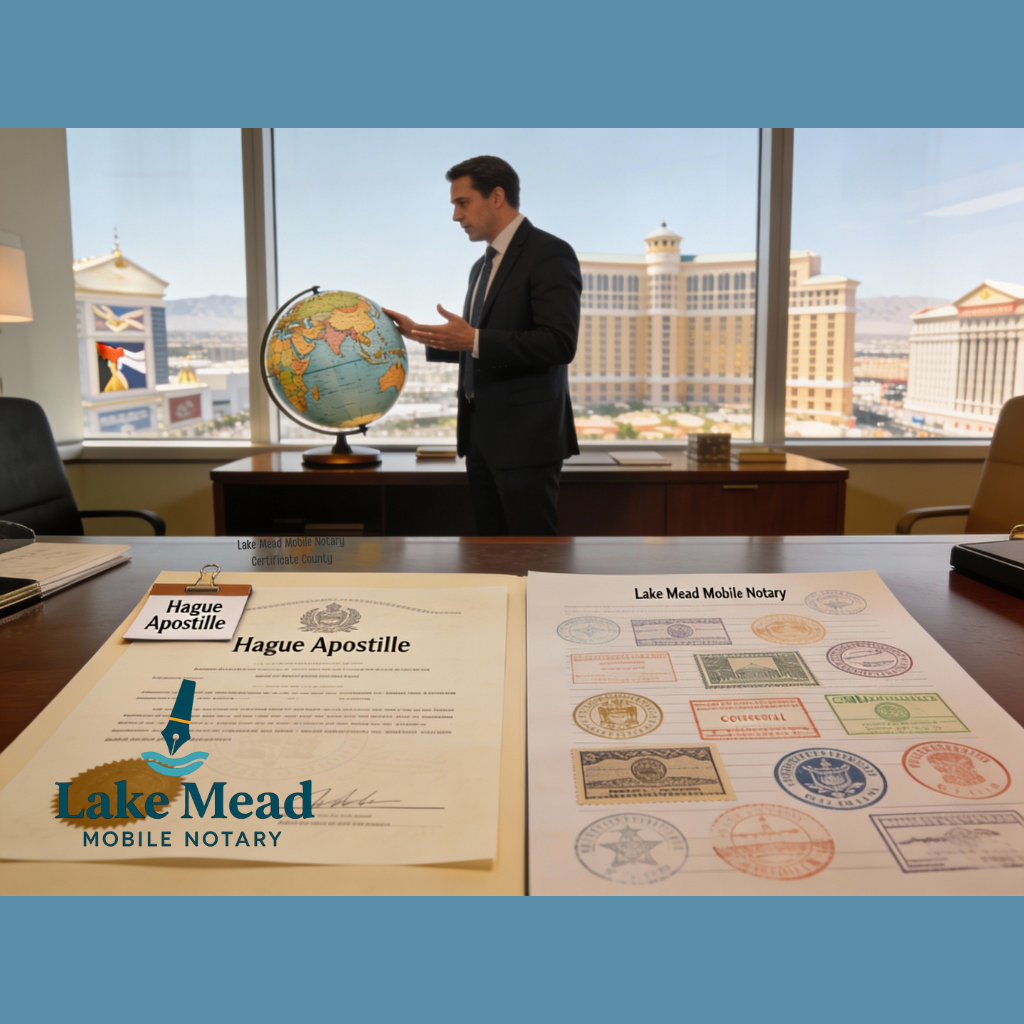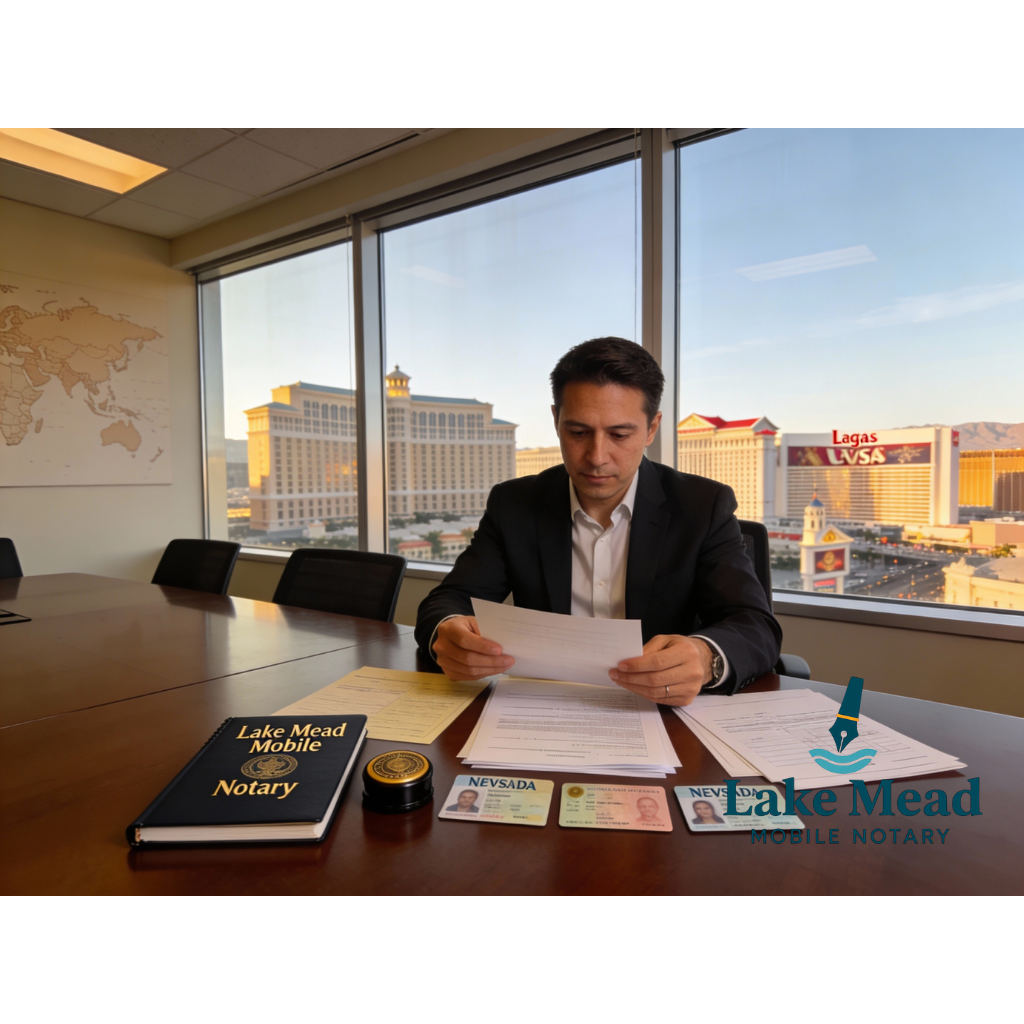Lien Sales and Abandoned Vehicle Affidavits for Tow Operators: Nevada VP-147 Guide 2025

Nevada tow operators and auction facilities must complete notarized VP-147 Lien Sale Affidavits before selling abandoned or impounded vehicles. This sworn affidavit certifies proper notification procedures were followed and allows DMV to transfer title from the debtor to the purchaser. Lake Mead Mobile Notary provides same-day on-site notarization at tow yards, auction facilities, and storage lots throughout Las Vegas, Henderson, North Las Vegas, and Clark County, ensuring lien sale packets meet Nevada DMV requirements and auction deadlines.
The Legal Framework for Tow Operators: Nevada tow yards, impound facilities, and auto auctions cannot sell abandoned or impounded vehicles without properly notarized VP-147 Lien Sale Affidavits. This sworn documentation proves compliance with Nevada's notification and waiting period requirements before title can transfer to auction buyers.
Lake Mead Mobile Notary provides on-site notarization at tow facilities, auction houses, and storage yards throughout Aliante, Black Mountain, Pahrump, and all of Clark County. Starting at $45 for single-signer notarization, we serve Copart, IAA, Manheim, and independent tow yards with same-day appointments and after-hours availability for auction deadline compliance.
Across towing industry discussions, mechanic shop forums, and auto auction communities, the VP-147 Lien Sale Affidavit generates more confusion than any other Nevada DMV form. New tow operators discover the hard way that proper notification procedures and notarized affidavits are non-negotiable. Auction houses reject vehicle submissions with incomplete VP-147 documentation. The result: vehicles sitting in storage accruing fees while operators scramble to understand Nevada's lien sale requirements.
"We towed an abandoned vehicle from a property management company in Henderson three months ago. Owner never retrieved it. We sent certified letters, waited the required 30 days, now we want to sell it at Copart to recover storage fees. But Copart won't accept it without a notarized VP-147. Our office manager tried to sign it at a bank, but they said they don't notarize business forms. Now we're stuck with a vehicle taking up yard space and accumulating storage costs with no way to sell it."
This scenario repeats daily across Clark County tow yards. The VP-147 isn't optional paperwork. It's the legal foundation for transferring title from an absent owner to an auction purchaser. Without proper notarization, Copart, IAA, and Manheim won't accept the vehicle. And without notarization by a Nevada-commissioned notary, DMV won't process the title transfer even if the auction accepts the vehicle.
The VP-147 Lien Sale Affidavit is a sworn statement under penalty of perjury that you (the tow operator or lienholder) followed Nevada's strict notification procedures. You're swearing that certified letters were sent to the registered owner, that proper waiting periods elapsed, and that all statutory requirements were met. False statements on VP-147 can result in criminal perjury charges and civil liability for wrongful conversion of property. That's why notarization is mandatory and why auction houses scrutinize every VP-147 for proper notarial certificates.
Companies like Quality Towing that remove vehicles from apartment complexes, business parking lots, and HOA properties. When owners don't retrieve vehicles within 30 days, VP-147 allows sale to recover towing and storage fees. Most common scenario for VP-147 usage in Clark County.
Facilities like Ewing Brothers that handle LVMPD and Henderson PD impounds. Abandoned vehicles from DUI arrests, evidence holds, or recovered stolen vehicles often require VP-147 when owners never claim them. Working with law enforcement adds additional documentation requirements.
Repair facilities that performed work but customers never paid or retrieved vehicles. Nevada mechanic's lien law allows shops to sell vehicles to recover repair costs after proper notification. VP-147 documents the lien sale process for DMV title transfer to auction buyer.
RV storage yards and vehicle storage facilities near Lake Mead area where owners stop paying rent. VP-267 Abandoned RV Title Affidavit is similar to VP-147 but specifically for recreational vehicles. Both require notarization before sale can proceed.
HOAs and apartment complexes in Sun City Aliante, Aliante, and other communities that contract with tow companies for parking enforcement. While the tow company usually handles VP-147, property managers sometimes need to sign supporting affidavits about vehicle abandonment.
3930 E Lone Mountain Rd, Las Vegas
Police-contract tow yard • LVMPD impounds
VP-147 notarization on-site for lien sales
Same-day service for auction deadlines
Locations #57 & #133 in Las Vegas
Major salvage and insurance auction
We notarize seller VP-147 packets
Available for pre-auction inspection days
7201 Englestad St, Las Vegas
Insurance total loss and abandoned vehicle auctions
Mobile notary for consignor documentation
After-hours service for evening inspections
Wholesale auto auction facility
Dealer and fleet consignments
VP-147 notarization for lien sale vehicles
Coordinated with auction schedule
Serving west valley and Boca Park area
Private property towing specialist
Regular VP-147 processing for abandoned vehicles
Same-day mobile notary visits
Nevada Revised Statutes Chapter 108 (Liens) establishes strict procedures for lien sales. Missing any step can invalidate your VP-147 and expose you to liability:
Vehicle must be in your lawful possession: towed from private property with authorization, police impound, mechanic's lien for unpaid repairs, or storage lien for unpaid fees.
Documentation needed: Tow authorization, police release, work orders, storage rental agreement
Obtain vehicle identification from VIN. Search Nevada DMV records for registered owner and lienholder. Must send notifications to both registered owner AND any lienholders of record (banks, finance companies).
Cost: $15 DMV title search fee per vehicle
Send certified letters, return receipt requested, to registered owner and all lienholders at addresses on DMV record. Letter must include: (1) vehicle description, (2) location, (3) storage fees owed, (4) notification of intent to sell, (5) timeframe for retrieval.
Nevada requirement: 15-30 days' notice depending on circumstances
Cannot sell vehicle until minimum waiting period elapses after mailing notification. Standard is 30 days for most situations. Clock starts when certified mail is sent, not when received or returned undeliverable.
Critical: Selling before statutory period expires = wrongful conversion
Fill out VP-147 Lien Sale Affidavit with: vehicle information, owner information from DMV records, dates of notification, total fees owed, date of intended sale. DO NOT sign yet.
Important: Must be accurate; false statements = perjury
Authorized company representative (tow yard manager, business owner, or designated agent with written authorization) signs VP-147 before Nevada notary. Notary verifies ID, administers oath, applies seal.
Mobile service: We come to your facility for same-day notarization
Provide notarized VP-147 plus supporting documentation to Copart, IAA, or other auction house. Auction reviews packet for completeness before accepting vehicle for sale.
Rejection reasons: Missing notary seal, expired notary commission, unsigned affidavit
After auction sale, buyer and auction house submit VP-147 plus bill of sale to Nevada DMV for title transfer. DMV verifies notarization and lien sale compliance before issuing new title to buyer.
Timeline: 30-45 days for title transfer completion
Mobile Notary Service at Your Facility:
Monthly Service Contracts for High-Volume Tow Operators:
Tow companies processing 10+ VP-147 affidavits monthly: Discounted rate of $40 per notarization with scheduled weekly visits. We come to your facility every Tuesday (or your preferred day), notarize all accumulated VP-147 forms in one visit. Saves your staff time hunting for notaries and ensures auction deadlines are never missed. Includes after-hours emergency availability for urgent auction submissions.
Cost Comparison: Mobile Service vs. Traditional Options:
The Hidden Cost of VP-147 Delays:
Vehicle storage costs: $25-50 per day per vehicle. Missing auction deadline due to notarization delays: +7 days to next auction = $175-350 in additional storage fees. Auction house rejecting improperly notarized VP-147: +14 days to correct and resubmit = $350-700 in storage fees. DMV rejecting title transfer due to invalid notarization: +30-45 days, buyer demanding refund, potential lawsuit. Our $45 mobile service with auction-deadline expertise prevents all these costly delays.
Either can sign, but the signer must have actual authority to bind the company and must be the person making the sworn statements in the affidavit. If your office manager handles all lien sales and has direct knowledge of the notification procedures, they can sign as the authorized agent. However, the notary will need to verify their identity and authority. Best practice: Designate one person as your lien sale agent and have them sign all VP-147 forms for consistency. If the owner is rarely available, provide written authorization documenting that the manager has authority to sign lien sale documents on behalf of the business.
Nevada law recognizes that proper notification attempt is sufficient even if the owner doesn't receive or refuses the letter. Keep the returned certified mail envelope and receipt as proof you attempted notification at the DMV-registered address. Include this documentation with your VP-147 packet when submitting to auction. The key is that you sent notification to the address on file with DMV; you're not responsible if the owner moved without updating their address. Document everything: make copies of returned mail, note the return date on your VP-147, and retain all postal receipts.
Yes, Nevada's mechanic's lien law (NRS 108.270) allows repair shops to pursue lien sales for unpaid work. Your VP-147 should reference the mechanic's lien statute and attach copies of: (1) repair work order signed by customer, (2) itemized invoice, (3) certified mail notification to customer at address provided when they dropped off vehicle, (4) waiting period documentation (30 days after notification). Make sure your notarized VP-147 specifically states this is a mechanic's lien sale. Auctions handle these slightly differently than abandoned vehicle sales, so call ahead to Copart or your chosen auction to confirm their specific documentation requirements.
Separate VP-147 for each vehicle. Nevada DMV processes title transfers individually, and each vehicle has different registered owners, VINs, and notification timelines. Attempting to combine multiple vehicles on one VP-147 will result in rejection by both the auction house and DMV. The good news: we can notarize multiple VP-147 forms in a single visit to your facility, with volume discounts for bulk processing. Schedule a weekly visit and we'll notarize all your accumulated lien sale affidavits at once.
We come directly to your facility anywhere in Clark County. Our tow yard notarization service is specifically designed for on-site visits. We'll meet your manager in the office, notarize all your VP-147 forms, and get out of your way quickly. Most tow yard visits take 15-30 minutes total for 3-5 VP-147 notarizations. We serve Aliante, Black Mountain, Pahrump, and all Clark County locations including areas near South Point and Boca Park.
Must be in person with physical Nevada notary seal. Nevada DMV does not accept remote online notarization (RON) for VP-147 or any vehicle title affidavits as of 2025. Auction houses also reject RON notarizations because many states don't recognize out-of-state RON seals. The VP-147 must have a physical ink impression of a Nevada notary seal to be valid for title transfer. This is why mobile notary service is essential for tow operators; we bring the physical notary seal to your location so you don't have to leave your facility.
If you need VP-147 notarization, you may also need:
Same-day mobile notarization for VP-147 and VP-267 lien sale affidavits at tow yards, auction facilities, and storage lots. We understand auction deadlines and DMV title transfer requirements. Serving Copart, IAA, Manheim, and independent tow operators throughout Clark County.
Expert mobile notary for VP-147, VP-267, and all Nevada lien sale affidavits. Licensed Nevada notaries • On-site tow yard service • Auction deadline expertise • Volume discounts available • After-hours support
Yes. Nevada law (NRS 108.270) requires you to send certified mail, return receipt requested, to both the registered owner AND all lienholders shown on the DMV title record. Missing either notification invalidates your entire VP-147 lien sale process, even if you properly notified the owner. This is the number one reason auction houses reject VP-147 submissions from tow operators.
The confusion is understandable. A former tow operator explains on automotive forums: "Tow company has to send 3 certified letters to both the titled owner and the lien holder over about 6 week period before they can lien sale the vehicle." But what happens when the lienholder is a bank that merged, went out of business, or has an outdated address on the DMV record?
📋 Nevada's Dual Notification Requirement Explained:
⚠️ What If You Can't Find Current Lienholder Information? If the lienholder on DMV records is a bank that no longer exists (merged, acquired, or failed), you have several options:
💡 The Most Common Mistake: Tow operators send certified mail only to the registered owner, assuming the bank "knows" the vehicle was towed because the owner stopped making payments. Wrong. The lienholder must receive independent notification of the impending lien sale. Without proof of certified mail to the lienholder (green return receipt or returned undeliverable envelope), your notarized VP-147 affidavit will be rejected by Pahrump auctions, Copart, IAA, and DMV during title transfer processing.
🏢 We provide on-site VP-147 notarization at tow yards throughout Aliante, North Las Vegas, and Clark County. During your notarization appointment, we can review your certified mail documentation to ensure both owner and lienholder notifications are properly documented before you sign the affidavit under oath.
Yes, you can proceed with VP-147 lien sale even if certified mail returns as "undeliverable," "attempted - not known," or "refused." Nevada law requires you to attempt proper notification at the DMV-registered address, but you're not responsible if the owner moved without updating their address or refuses to accept the letter. The key is documenting your good-faith notification attempt.
This is the second most discussed lien sale question on automotive forums and r/legaladvice. Tow operators panic when certified mail comes back weeks after sending, thinking the entire lien sale process must start over. That's not correct. What matters is that you sent notification to the correct address on file with Nevada DMV at the time you mailed it.
📋 How to Document Undeliverable Certified Mail for VP-147:
⚠️ Critical Distinction - Undeliverable vs. Never Sent: Nevada courts and DMV distinguish between "mail returned undeliverable" (proper notification attempt) and "mail never sent" (no notification attempt). If you skip certified mail entirely and claim the owner "couldn't be found," your VP-147 will be rejected and you could face liability for wrongful sale. But if you can prove you sent certified mail to the DMV-registered address and USPS returned it undeliverable, you've met Nevada's notification requirement.
💡 The 30-Day Waiting Period Starts When You Mail It: Confusion exists about when the clock starts. The 30-day waiting period begins on the date you send certified mail, not when it's delivered or returned. Example: You mail certified letters on May 1st to owner and lienholder. Owner's letter is delivered May 4th (signed green card returned). Lienholder's letter returns undeliverable May 8th. You can still proceed with lien sale on June 1st (30 days after May 1st mailing date) because you attempted notification to both parties.
🏢 Real-World Example from Las Vegas Tow Yard: Tow company in Boca Park area towed abandoned vehicle from apartment complex. DMV records showed owner at an address in Henderson. Certified mail sent September 1st, returned "moved - no forwarding address" September 9th. Tow company kept the returned envelope, waited until October 2nd (31 days after mailing), then had VP-147 notarized at their facility. Auction accepted the vehicle because notification attempt was properly documented. The vehicle sold, title transferred to buyer with no issues.
⚠️ When Undeliverable Mail Becomes a Problem: If certified mail to the lienholder (bank) returns undeliverable AND you cannot locate the bank through research (merger, acquisition, failure), consult an attorney before proceeding. While owner notification can be satisfied with undeliverable mail, lienholder notification may require additional steps if the lien is recent and valuable.
Yes. Nevada law (NRS 108.297) requires you to account for and pay any surplus from the lien sale. After recovering your documented towing, storage, and auction fees, you must pay excess proceeds first to lienholders, then to the vehicle owner. You cannot simply keep all auction proceeds because you obtained clean title through VP-147. This is one of the most misunderstood aspects of Nevada lien sales.
A shocked Reddit discussion illustrates the confusion: "I always thought the right thing would be for the tow vendor to pay any excess from the sale over their storage costs to the lienholder but they take possession of the whole vehicle?" The answer: Taking possession for lien sale is legal, but keeping surplus proceeds beyond documented costs is illegal conversion of property.
📋 Nevada Surplus Distribution Hierarchy (NRS 108.297):
⚠️ Real-World Example of Surplus Calculation:
Different scenario - No lien on record:
💡 Why This Matters for VP-147 Compliance: When you sign your notarized VP-147 affidavit, you're swearing under oath that you followed Nevada's lien sale procedures. Part of those procedures is accounting for surplus. If the owner later discovers you kept $5,000 in surplus that legally belonged to them or their lender, you face: (1) civil lawsuit for conversion, (2) potential perjury charges for false VP-147 affidavit, (3) loss of your tow operator license, (4) criminal charges for theft by conversion.
🏢 Best Practice for Tow Operators: Create a standard surplus calculation worksheet for every lien sale. Document: (1) Auction gross proceeds, (2) Itemized costs (towing, storage with daily rate and number of days, title search, certified mail, auction fees), (3) Net surplus calculation, (4) Lienholder payment if applicable with proof of payment, (5) Owner surplus payment with certified mail proof of delivery. Keep these records for 3-5 years. When we notarize VP-147 forms at Sun City Aliante or other Clark County tow yards, we can review your surplus calculation to ensure it's properly documented before you sign under oath.
